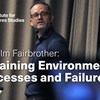mitigated
Tax Setting and Electoral Accountability with Policy-Motivated Politicians
Professor Eva Mörk, Department of economics, Uppsala University Seminars host is Stefan Svallfors. The seminars are free of charge and take place at 13.00–14.30 in the Institute’s seminar room at Hollä
Dual Climate Change Responsibility: on the moral divergences between mitigation and adaptation
in: Paul G. Harris (ed.) Ethics, Environmental Justice, and Climate Change, Chelthenham: Edward Elgar. Climate change cannot be fully understood or effectively mitigated without considering its ethical
Malcolm Fairbrother: Explaining Environmental Successes and Failures
Venue:Institutet för framtidsstudier, Holländargatan 13, 4th floor, Stockholm, or online. Research seminar with Malcolm Fairbrother, Professor of Sociology, researcher at the Institute for Futures Stud

Malcolm Fairbrother: Explaining Environmental Successes and Failures
Research seminar with Malcolm Fairbrother, Professor of Sociology, researcher at the Institute for Futures Studies. Abstract Why has the world failed so disastrously on climate change? Humanity has su
Quill R. Kukla: Healthism, Neurodiversity, and Respectability Politics
Venue: Institute for Futures Studies, Holländargatan 13 in Stockholm Research seminar with Quill R. Kukla, Professor of Philosophy and Disability Studies at Georgetown University and fellow at the SOCRAAbstract

Quill Kukla: Healthism, Neurodiversity, and Respectability Politics
“Healthism” is the pervasive ideology according to which each of us is responsible for valuing and protecting our own health and prioritizing health over other values, while society has the right to e
Swedish Parental Leave and Gender Equality. Achievements and Reform Challenges in a European Perspective
This study sets out to discuss the Swedish parental leave system and identify achievements, policy dilemmas and reform alternatives in a European perspective. In perspective of changing demographic st
What can be understood, what can be compared, and what counts as context? Studying lawmaking in world history
In: Arne Jarrick, Janken Myrdal, Maria Wallenberg-Bondesson (eds.). Methods in world history. A critical approach. Lund: Nordic Academic Press. Methods in World Historyis the first international volume
The Oxford Handbook of Population Ethics - Interview with the editors
If we can affect how many people will be born in the future, what does that mean for our decisions today? Would it be bad if much fewer people would exist in the future, as an adaption to climate chan
Class, Values, and Attitudes Towards Redistribution: A European Comparison
European Sociological Review June 22, 2011. European Sociological Review, Vol 29 (2013) pp 155–167. DOI:10.1093/esr/jcr046, available online at www.esr.oxfordjournals.org Abstract Using data from the Europ








